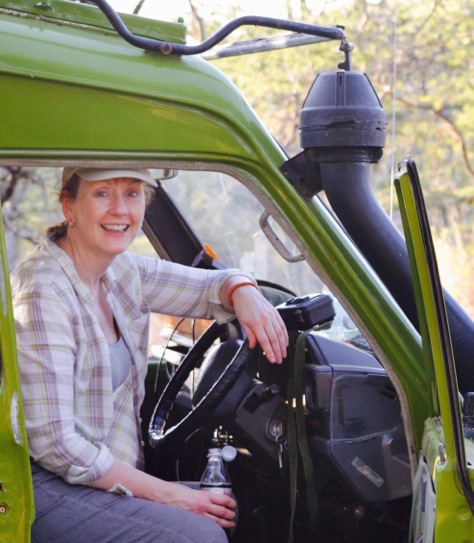
As an animal behaviorist, Suzanne MacDonald may find herself hanging out with pandas at the zoo, observing elephants in Africa, or cursing at raccoons in the backyards of Toronto.
Did you know that renowned York University psychology professor and animal behaviorist Suzanne MacDonald ('84 BSc, '86 MSc, '89 PhD) started out as a University of Alberta science student? She will be speaking here at a free lecture on Wednesday, March 30, at 1:30pm in CCIS 1-140. We caught up with her en route to Edmonton to pick her brain about how her background helped bring her to where she is today.
Faculty of Science: How did you come to be interested in animal behaviour?
"I can't overstate how blessed I feel having had the opportunity to be a student at the U of A. The privilege to learn from the best scientists in the world, and to see their excitement and passion for their research, is the reason that I chose a career in academia."
MacDonald: I can't remember a time when I wasn't interested in animal behaviour! I think most kids love animals, and I certainly was no exception. I started a "Conservation Club" when I was 9 years old and also had a rather large menagerie of animals (cat, dog, rabbit, horses, ducks and a variety of rescued birds).
Faculty of Science: How is your research unique in terms of blending your psychology background with conservation issues?
MacDonald: My undergraduate work at the U of A was in zoology and genetics, and my grad work was in psychology, so thanks to the great profs with whom I studied, I have an interdisciplinary background. My basic science training combined with being a psychologist gives me an unusual perspective compared to my colleagues in biology. I always focus on how the animals view a situation, which often provides a different way of approaching a problem. I think that having a psychologist on a conservation team should be a requirement. My colleagues may feel differently ; )
Faculty of Science: What is the most rewarding aspect of working in animal behavior? / What emerging trends are you most excited about?
MacDonald: The most rewarding aspect of working in animal behaviour is being able to get to see-and know-a wide variety of animals, each with their own unique and wonderful characteristics. On any given day, I may be hanging out with pandas at the zoo, or observing elephants in Africa, or cursing at raccoons in the backyards of Toronto!
I love the emerging trend to include the public in research as 'citizen scientists'. Having knowledgeable 'amateur' naturalists involved in projects like identifying species in photos from motion-activated cameras, or helping keep animals safe when crossing roads, is to me the best thing we can do to democratize science and learn from each other. I also love to see people posting cool animal behaviour videos on YouTube. With technology, we can see things in the animal world that we never knew existed before. It's amazing!
Faculty of Science: How did your background as a University of Alberta student prepare you for your career?
MacDonald: I can't overstate how blessed I feel having had the opportunity to be a student at the U of A. The privilege to learn from the best scientists in the world, and to see their excitement and passion for their research, is the reason that I chose a career in academia. U of A is a world class institution, and I am proud to be an alumnus.
Faculty of Science: Why is it important to you to share your findings with the public?
MacDonald: The public funds our universities, and I feel that it is vital to share our results-and our enthusiasm for research-with our supporters. Making basic science accessible to everyone (especially young people) and doing research that will benefit communities, in Canada and around the world, is what we're here for.
Faculty of Science: How would you encourage students/prospective students to get involved with animal behaviour research?
MacDonald: I always encourage high school students to volunteer wherever they can to get some hands-on animal experience. Help out at a local zoo, wildlife rehab centre, whatever. Spend time observing animals in nature. Learn basic science-from the micro to macro level. Read everything you can get your hands on. And during your undergraduate years, make sure you take a least one field course. It will change your life!
Interested in learning more? Don't miss MacDonald's free lecture Wednesday, March 30 at 1:30pm in CCIS 1-140.